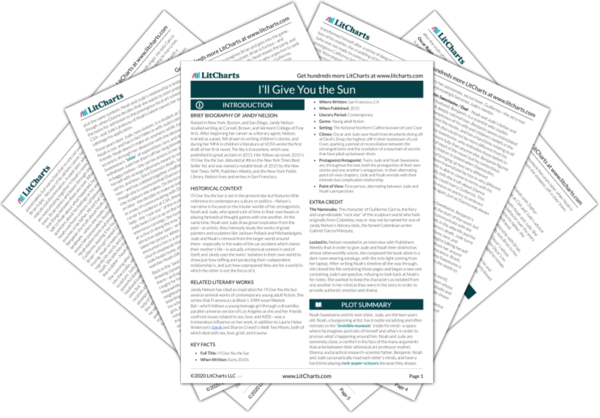Just as Noah has the invisible museum, Jude Sweetwine, too, has a coping mechanism which allows her to see the world on her own terms: her deceased grandmother’s “bible” of superstition, lore, and wisdom. With advice like “To avoid serious illness, keep an onion in your pocket” and “Every picture taken of you reduces your spirit and shortens your life,” Grandma Sweetwine’s bible is chock-full of unique—if slightly batty—advice for getting through life. Jude’s chapters are set in the “future,” when she and Noah are sixteen—they have lost their mother Dianna and are struggling to navigate their teenage years while dealing with the trauma of their loss and the schism it has created between the two of them. In this way, Grandma’s bible and the aphorisms contain within it become a symbol of Jude’s desire to make sense of a world that has lost all logical reasoning. Her mother is dead, her twin brother has gone from introverted weirdo to hapless normie, and her own bad decisions—such as losing her virginity to an older boy, Zephyr, despite not really wanting to, and sabotaging Noah’s application to the prestigious CSA—have derailed her young life. Unable to understand why things are so out of control or how she can possibly get them back track, Jude turns to Grandma Sweetwine’s aphorism to make her way through the world. Even if the advice contained therein is strange and offbeat, it at least gives Jude a pattern to follow and a way of understanding things in the wake of everything logical having fallen apart.
Grandma Sweetwine’s Bible and Aphorisms Quotes in I’ll Give You the Sun
“This sculpture needs to be made so much you cry like this?”
I turn around. He’s leaning against the wall by the painting of the kiss, his arms crossed.
“Yes,” I gasp out, then say more calmly, “Yes.” Is he changing his mind? The sob begins to retreat.
He’s stroking his chin. His expression softens. “You need to make this sculpture so badly, you will risk your young life by sharing space with a disease-carrying cat?”
“Yes. Totally, yes. Please.”
“You are sure you want to forsake the warm, moist breath of clay for the cold, unforgiving eternity of stone.”
“I am sure.” Whatever that means.
“Come back tomorrow afternoon. Bring your portfolio and a sketchpad. And tell your brother to give you back the sun, trees, stars, all of it already. I think you need.”

Unlock explanations and citation info for this and every other I’ll Give You the Sun quote.
Plus so much more...
Get LitCharts A+I take him by the shoulders. “Noah.” My voice has returned. “It wasn’t your fault. It wasn’t.” I repeat the words until I’m sure he’s heard them, believes them. “It wasn’t anyone’s. It just happened. This terrible thing happened to her. This terrible thing happened to us.”
And then it’s my turn. I’m being shoved forward, shoved right out of my skin with just how terrible—Mom ripped out of my life the very moment I needed her the most, the bottomless unconditional shielding sheltering love she had for me taken forever. I let myself feel the terrible, surrender to it finally instead of running from it, instead of telling myself it all belongs to Noah and not to me, instead of putting an index of fears and superstitions between me and it, instead of mummifying myself in layers of clothing to protect myself from it, and I’m falling forward with the force of two years of buried grief, the sorrow of ten thousand oceans finally breaking inside me—
I let it. I let my heart break.
And Noah is there, strong and sturdy, to catch me, to hold me through it, to make sure I’m safe.
Our connection is still so natural, though now, for me, it’s tinged with guilt because of Dad. I turn back to my clay model, start caressing my mother’s shoulder into shape, her upper arm. “It’s like some part of me knew,” I tell him, working the bend of her elbow. “I don’t know what I knew, but I knew I was supposed to be here. You made me feel better too. So much better. I was so locked in.”
“This is what I think,” he says. “I think maybe Dianna, she break your bowls, so you come find a stone carver.”
I look at him. “Yeah,” I say, the back of my neck tingling. “Me too.”
Because who knows? Who knows anything? Who knows who’s pulling the strings? Or what is? Or how? Who knows if destiny is just how you tell yourself the story of your life? Another son might not have heard his mother’s last words as a prophecy but as drug-induced gibberish, forgotten soon after. Another girl might not have told herself a love story about a drawing her brother made. Who knows if Grandma really thought the first daffodils of spring were lucky or if she just wanted to go on walks with me through the woods? Who knows if she even believed in her bible at all or if she just preferred a world where hope and creativity and faith trump reason? Who knows if there are ghosts (sorry, Grandma) or just the living, breathing memories of your loved ones inside you, speaking to you, trying to get your attention by any means necessary? Who knows where the hell Ralph is? (Sorry, Oscar.) No one knows.
So we grapple with the mysteries, each in our own way.












